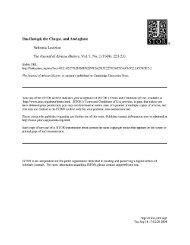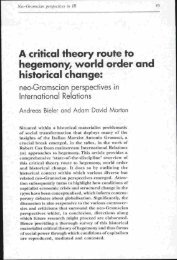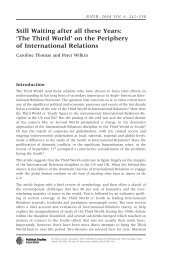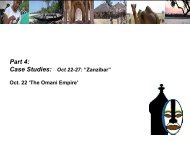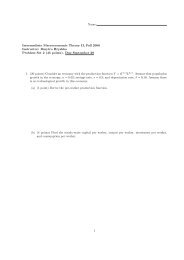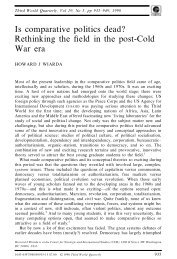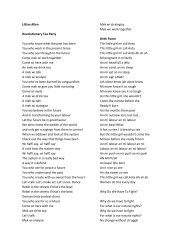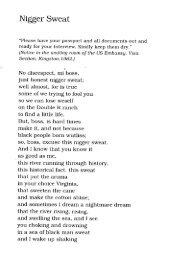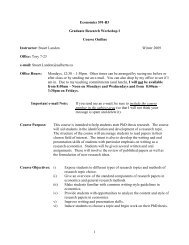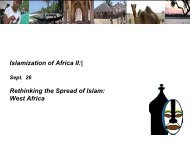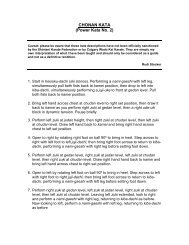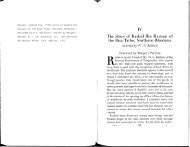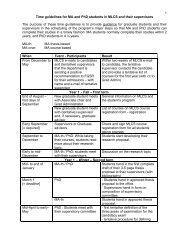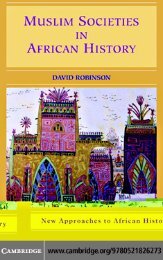personal memories revolutionary states and indian ocean migrations
personal memories revolutionary states and indian ocean migrations
personal memories revolutionary states and indian ocean migrations
Create successful ePaper yourself
Turn your PDF publications into a flip-book with our unique Google optimized e-Paper software.
agony <strong>and</strong> struggle through the prism of the whole Arab-Muslim world <strong>and</strong> the<br />
road to salvation was in the unity of that world. The concern of al-Falaq about Arab<br />
unity was best expressed in its reaction to the death of King Ghāzī of Iraq:<br />
The whole Arab nation is mourning. His death was devastating to the<br />
hopes of Iraqis but also catastrophic for the dreams of seventy million<br />
Arabs <strong>and</strong> Arabized between Basra to the East, Marrakech to the West,<br />
Aleppo to the North <strong>and</strong> Zanzibar to the South. The hopes were for the<br />
agreement <strong>and</strong> union of all Arab nations. 75<br />
In reality, al-Falaq was not mourning Ghāzī himself but was rather<br />
concerned about the hopes placed on Iraq as the beacon of Arabism <strong>and</strong> its<br />
potential role in uniting the Arab world. Iraq at the time occupied a special place in<br />
the minds <strong>and</strong> hearts of Arabs. “To many Arab nationalists in the 1920s <strong>and</strong><br />
1930s,” Adeed Dawisha has commented, “Iraq seemed best equipped to fill the<br />
heroic role played by Prussia in uniting the German-speaking people into one<br />
unified German nation-state.” 76 The indispensability of Arab unity was a recurrent<br />
theme on the pages of al-Falaq, a theme discussed either by its editors <strong>and</strong><br />
contributors or by other pan-Arab newspapers such as al-Fatḥ, the articles of whose<br />
editor, Muḥibb al-Dīn al-Khaṭīb, al-Falaq reprinted frequently.<br />
CONCLUSION<br />
The Omani elite in Zanzibar positioned itself, until World War II, within<br />
the Arab world’s intellectual <strong>and</strong> political movements of Islamic reformism, pan-<br />
Ibadism, pan-Islamism <strong>and</strong> Arabism. Its members were affiliated to a broad<br />
spectrum of networks <strong>and</strong> communities debating <strong>and</strong> shaping a collective identity.<br />
Islam <strong>and</strong> Arabism were its parameters; Oman, the Maghrib <strong>and</strong> the Mashriq with<br />
their networks of ‘ulama, writers <strong>and</strong> thinkers were partners in outlining <strong>and</strong><br />
articulating those parameters. Through those ties <strong>and</strong> connections, <strong>and</strong> through the<br />
prism of its Arab-Muslim identity, the Omani elite pulled Zanzibar into the orbit of<br />
the Arab world <strong>and</strong> molded the history of the isl<strong>and</strong> with that of other Arab<br />
communities. From that perspective, Zanzibar earned, in the eyes of many Omanis<br />
as well as others, a reputation of another ‘Andalusia’ that Arabs had (re)created on<br />
the East African coast. 77<br />
By defining itself in relationship to movements that upheld religious revival<br />
<strong>and</strong> Arab cultural renaissance, the Omani elite perceived its identity outside the<br />
narrow scope of British classifications based on economic <strong>and</strong> social status. While<br />
that status shaped much of Zanzibari politics before, during <strong>and</strong> after British rule, it<br />
was neither the only marker of identities on the isl<strong>and</strong> nor one of exclusive concern<br />
for the Omani elite. The religion <strong>and</strong> the language of that elite remained at the core<br />
of its identity <strong>and</strong> the more those two elements were deemed vulnerable or under<br />
attack, the more protective of them <strong>and</strong> assertive of their precedence Omanis<br />
became.<br />
ENDNOTES<br />
Funding for research for this project was provided by a Social Sciences <strong>and</strong> Humanities Research<br />
Council Doctoral Fellowship, a University of Alberta Dissertation Fellowship <strong>and</strong> a Canadian<br />
Federation of University Women Margaret Brine Scholarship.<br />
http://web.mit.edu/cis/www/mitejmes/<br />
53



